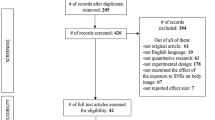Abstract
The paper outlines the advantages, disadvantages, and other implications of using the Internet to collect data from gaming addicts. Drawing from experience of numerous addiction studies carried out online by the author, and by reviewing the methodological literature examining online data collection among both gambling addicts and video game addicts, the main issues concerning data collected using the Internet are discussed and reviewed. This paper extends upon previous methodological papers in the area by outlining some of the methodological and ethical issues associated with specific (rather then generic) online methodologies that have been used to carry out gaming addiction research. The specific online data collection methods examined include the collection of gambling and video game addiction research data via (i) online questionnaires, (ii) online forums, (iii) online participant observation, (iv) online secondary data, (v) online interviews, (vi) online exemplar websites, and (vii) mixed methods online evaluation. It is concluded that the many advantages of online research methods can be a useful and practical way of examining many different aspects of gambling and video game addictions.
Similar content being viewed by others
Notes
It should also be noted that all advisors had been aware before the start of the study that the evaluation team would be posing as gambling addicts and that all advisors accepted this as a legitimate part of the evaluation process.
References
Arksey, H., & O’Malley, L. (2005). Scoping studies: Towards a methodological framework. International Journal of Social Research Methodology, 8(1), 19–32. doi:10.1080/1364557032000119616.
Chappell, D., Eatough, V. E., Davies, M. N. O., & Griffiths, M. D. (2006). EverQuest—It’s just a computer game right? An interpretative phenomenological analysis of online gaming addiction. International Journal of Mental Health and Addiction, 4, 205–216. doi:10.1007/s11469-006-9028-6.
Cole, H., & Griffiths, M. D. (2007). Social interactions in massively multiplayer online role-playing gamers. Cyberpsychology and Behavior, 10, 575–583. doi:10.1089/cpb.2007.9988.
Eyles, J. (1988). Interpreting the geographical world: Qualitative approaches in geographical research. In J. Eyles & D. Smith (Eds.), Qualitative methods in human geography, pp. 1–16. Totawa, NJ: Barnes & Noble.
Eysenbach, G., & Till, J. E. (2001). Ethical issues in qualitative research on internet communities. British Medical Journal, 323, 1103–1105. doi:10.1136/bmj.323.7321.1103.
Fisher, S., & Griffiths, M. D. (1995). Current trends in slot machine gambling: Research and policy issues. Journal of Gambling Studies, 11, 239–247. doi:10.1007/BF02104791.
Griffiths, M. D. (1991). Amusement machine playing in childhood and adolescence: a comparative analysis of video games and fruit machines. Journal of Adolescence, 14, 53–73. doi:10.1016/0140-1971(91)90045-S.
Griffiths, M. D. (2000). Does internet and computer “addiction” exist? Some case study evidence. Cyberpsychology and Behavior, 3, 211–218. doi:10.1089/109493100316067.
Griffiths, M. D. (2002). Using the internet for qualitative clinical research. Clinical Psychologist, 10, 27–30.
Griffiths, M. D. (2005a). The relationship between gambling and videogame playing: a response to Johansson and Gotestam. Psychological Reports, 96, 644–646. doi:10.2466/PR0.96.3.644-646.
Griffiths, M. D. (2005b). A “components” model of addiction within a biopsychosocial framework. Journal of Substance Abuse, 10, 191–197. doi:10.1080/14659890500114359.
Griffiths, M. D. (2008). Digital impact, crossover technologies and gambling practices. Casino and Gaming International, 4(3), 37–42.
Griffiths, M. D., & Wood, R. T. A. (2000). Risk factors in adolescence: the case of gambling, video-game playing and the internet. Journal of Gambling Studies, 16, 199–225. doi:10.1023/A:1009433014881.
Griffiths, M. D., & Barnes, A. (2008). Internet gambling: an online empirical study among student gamblers. International Journal of Mental Health and Addiction, 6, 194–204. doi:10.1007/s11469-007-9083-7.
Griffiths, M. D., Davies, M. N. O., & Chappell, D. (2003). Breaking the stereotype: the case of online gaming. Cyberpsychology and Behavior, 6, 81–91. doi:10.1089/109493103321167992.
Griffiths, M. D., Davies, M. N. O., & Chappell, D. (2004a). Demographic factors and playing variables in online computer gaming. Cyberpsychology and Behavior, 7, 479–487. doi:10.1089/cpb.2004.7.479.
Griffiths, M. D., Davies, M. N. O., & Chappell, D. (2004b). Online computer gaming: a comparison of adolescent and adult gamers. Journal of Adolescence, 27, 87–96. doi:10.1016/j.adolescence.2003.10.007.
Griffiths, M. D., Parke, J., Wood, R. T. A., & Rigbye, J. (2009). Online poker gambling in university students: Further findings from an online survey. International Journal of Mental Health and Addiction. doi:10.1007/s11469-009-9203-7.
Grüsser, S. M., Thalemann, R., & Griffiths, M. D. (2007). Excessive computer game playing: Evidence for addiction and aggression? Cyberpsychology and Behavior, 10, 290–292. doi:10.1089/cpb.2006.9956.
Herbert, S. (2000). For ethnography. Progress in Human Geography, 2, 550–568. doi:10.1191/030913200100189102.
Hussain, Z., & Griffiths, M. D. (2008). Gender swapping and socialising in cyberspace: an exploratory study. Cyberpsychology and Behavior, 11, 47–53. doi:10.1089/cpb.2007.0020.
Hussain, Z., & Griffiths, M. D. (2009). Excessive use of massively multi-player online role-playing games: a pilot study. International Journal of Mental Health and Addiction. doi:10.1007/s11469-009-9202-8.
King, D., Delfabbro, P., & Griffiths, M. D. (2009). The psychological study of video game players: Methodological challenges and practical advice. International Journal of Mental Health and Addiction. doi:10.1007/s11469-009-9198-0.
Ley, D. (1988). Interpretive social research in the inner city. In J. Eyles (Ed.), Research in human geography, pp. 121–138. Oxford: Blackwell.
Lofland, J. (1976). Doing social life: The qualitative study of human interaction in natural settings. New York: Wiley.
Mays, N., Roberts, E., & Popay, J. (2001). Synthesising research evidence. In N. Fulop, P. Allen, A. Clarke & N. Black (Eds.), Studying the organisation and delivery of health services: Research methods. London: Routledge.
Meredith, A., Hussain, Z., & Griffiths, M. D. (2009). Online gaming: A scoping study of massively multi-player online role playing games. Electronic Commerce Journal. doi:10.1007/s10660-009-9029-1.
Niemz, K., Griffiths, M. D., & Banyard, P. (2005). Prevalence of pathological Internet use among university students and correlations with self-esteem, GHQ and disinhibition. Cyberpsychology and Behavior, 8, 562–570. doi:10.1089/cpb.2005.8.562.
Paccagnella, L. (2006). Getting the seats of your pants dirty: Strategies for ethnographic research on virtual communities. Journal of Computer Mediated Communication, 3(1). Located at: http://www3.interscience.wiley.com/cgi-bin/fulltext/120837722/HTMLSTART [Last accessed February 1 2009].
Parke, J., & Griffiths, M. D. (2002). Slot machine gamblers—Why are they so hard to study? Journal of Gambling Issues, 6. Located at: http://www.camh.net/egambling/issue6/opinion/index.html (Last accessed February 2 2009).
Parke, A., & Griffiths, M. D. (2006). United Kingdom computer mediated communication and poker gambling: a cyber-ethnographic study of poker-web communities. Paper presented at the 13th International Conference on Gambling and Risk Taking, Lake Tahoe, USA. May.
Parke, J., & Griffiths, M. D. (2008). Participant and non-participant observation in gambling environments. ENQUIRE, 1, 1–18.
Smeaton, M., & Griffiths, M. D. (2004). Internet gambling and social responsibility: an exploratory study. Cyberpsychology and Behavior, 7, 49–57. doi:10.1089/109493104322820110.
Smith, J. A., & Osborn, M. (2003). Interpretative phenomenological analysis. In J. A. Smith (Ed.), Qualitative psychology. A practical guide to research methods, pp. 51–80. London: Sage.
Wardle, H., & Robinson, C. (2007). Who chooses web surveys? Mode choices among youth cohort studies respondents. Proceedings of the 8th International Conference of the Association of Survey Computing.
Wardle, H., Sproston, K., Orford, J., Erens, B., Griffiths, M. D., Constantine, R., et al. (2007). The Briish gambling prevalence survey 2007. London: The Stationery Office.
Wood, R. T. A., & Griffiths, M. D. (2007a). A qualitative investigation of problem gambling as an escape-based coping strategy. Psychology and Psychotherapy: Theory, Research and Practice, 80, 107–125.
Wood, R. T. A., & Griffiths, M. D. (2007b). Online data collection from gamblers: Methodological issues. International Journal of Mental Health and Addiction, 5, 151–163. doi:10.1007/s11469-007-9055-y.
Wood, R. T. A., & Griffiths, M. D. (2007c). Online guidance, advice, and support for problem gamblers and concerned relatives and friends: an evaluation of the Gam-Aid pilot service. British Journal of Guidance and Counselling, 35, 373–389. doi:10.1080/03069880701593540.
Wood, R. T. A., Gupta, R., Derevensky, J., & Griffiths, M. D. (2004a). Video game playing and gambling in adolescents: Common risk factors. Journal of Child & Adolescent Substance Abuse, 14, 77–100. doi:10.1300/J029v14n01_05.
Wood, R. T. A., Griffiths, M. D., Chappell, D., & Davies, M. N. O. (2004b). The structural characteristics of video games: a psycho-structural analysis. Cyberpsychology and Behavior, 7, 1–10. doi:10.1089/109493104322820057.
Wood, R. T. A., Griffiths, M. D., & Eatough, V. (2004c). Online data collection from videogame players: Methodological issues. Cyberpsychology and Behavior, 7, 511–518.
Wood, R. T. A., Griffiths, M. D., & Parke, A. (2007a). Experiences of time loss among videogame players: an empirical study. Cyberpsychology and Behavior, 10, 45–56. doi:10.1089/cpb.2006.9993.
Wood, R. T. A., Griffiths, M. D., & Parke, J. (2007b). The acquisition, development, and maintenance of online poker playing in a student sample. Cyberpsychology and Behavior, 10, 354–361. doi:10.1089/cpb.2006.9944.
Widyanto, L., Griffiths, M. D., Brunsden, V., & McMurran, M. (2008). The psychometric properties of the internet related problem scale: a pilot study. International Journal of Mental Health and Addiction, 6, 205–213. doi:10.1007/s11469-007-9120-6.
Yardley, L. (2000). Dilemmas in qualitative health research. Psychology and Health, 15, 215–28.
Yin, R. (1989). Case study research: Design and methods (2nd ed.). Beverly Hills, CA: Sage.
Author information
Authors and Affiliations
Corresponding author
Rights and permissions
About this article
Cite this article
Griffiths, M.D. The Use of Online Methodologies in Data Collection for Gambling and Gaming Addictions. Int J Ment Health Addiction 8, 8–20 (2010). https://doi.org/10.1007/s11469-009-9209-1
Received:
Accepted:
Published:
Issue Date:
DOI: https://doi.org/10.1007/s11469-009-9209-1



